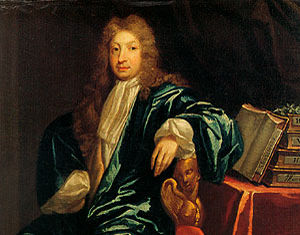Our souls sit close and silently within, And their own webs from their own entrails spin; And when eyes meet far off, our sense is such, That, spider-like, we feel the tenderest touch.

"John Dryden" was an English poet, literary critic, translator, and playwright who was made Poet Laureate of the United Kingdom/Poet Laureate in 1668.
He is seen as dominating the literary life of Restoration (England)/Restoration England to such a point that the period came to be known in literary circles as the Age of Dryden. Walter Scott called him "Glorious John."
If you enjoy these quotes, be sure to check out other famous poets! More John Dryden on Wikipedia.They think too little who talk too much.
None are so busy as the fool and knave.
Tomorrow, do thy worst, for I have lived today.
Beware the fury of a patient man.
Love is not in our choice but in our fate.
Dancing is the poetry of the foot.
I'm a little wounded but I'm not slain; I will lay me down for to bleed awhile, Then I'll rise and fight with you again.
Love works a different way in different minds, the fool it enlightens and the wise it blinds.
The conscience of a people is their power.
Dreams are but interludes that fancy makes... Sometimes forgotten things, long cast behind Rush forward in the brain, and come to mind.
Better shun the bait, than struggle in the snare.
So softly death succeeded life in her, She did but dream of heaven, and she was there.
Love is love's reward.
Set all things in their own peculiar place, and know that order is the greatest grace.
But far more numerous was the herd of such, Who think too little and who talk too much.
Happy the man, and happy he alone, He, who can call to-day his own: He who, secure within, can say, To-morrow do thy worst, for I have lived today.
We must beat the iron while it is hot, but we may polish it at leisure.
Love reckons hours for months, and days for years; And every little absence is an age.
And virtue, though in rags, will keep me warm.
Let grace and goodness be the principal loadstone of thy affections. For love which hath ends, will have an end; whereas that which is founded on true virtue, will always continue.
Copyright © 2024 Electric Goat Media. All Rights Reserved.